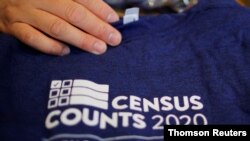The Trump administration on Tuesday gave up on its plans to include a citizenship question on the 2020 U.S. census.
This means the U.S. Census Bureau can now start printing forms to be sent to more than 100-million American homes after Trump himself questioned whether the once-every-decade population count could be delayed. A delay would have violated federal law.
The census is important because it determines how many congressional seats are assigned to each state and how hundreds of billions of dollars in federal money is distributed.
The Supreme Court ruled 5-4 last week against the administration's request for a citizenship question on the census.
Justice Department lawyers argued the question was needed to help enforce laws protecting minority voting rights.
Chief Justice John Roberts sided with the court's four liberal justices and wrote for the majority that the argument was "contrived" and did not meet the standards for a clear explanation for why the administration wanted to take such actions.
The citizenship question would have led to a population undercount by discouraging Hispanics and other immigrants from participating in the survey, according to critics. That would have given Republicans an edge in Democratic-leaning congressional districts.
Commerce Secretary Wilbur Ross said in a statement he disagreed with the Supreme Court's decision, but that he respects it and the census printing process has begun.
Trump also expressed opposition to going ahead with the census without his desired citizenship question.
"A very sad time for America when the Supreme Court of the United States won't allow a question of 'Is this person a Citizen of the United States?' to be asked on the #2020 Census!" he wrote on Twitter.





